

Jing Daily: The Business of Luxury and Culture in China. Expected to become the world’s largest by 2015, China’s luxury e-commerce market is becoming as profitable as it is overcrowded.
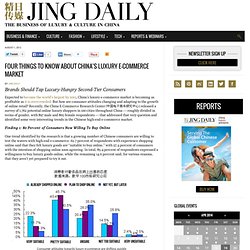
But how are consumer attitudes changing and adapting to the growth of online retail? Recently, the China E-Commerce Research Center (中国电子商务研究中心) released a survey of 1,762 potential online luxury shoppers in 100 cities throughout China — roughly divided in terms of gender, with 897 male and 865 female respondents — that addressed that very question and identified some very interesting trends in the Chinese high-end e-commerce market.
Finding 1: 80 Percent of Consumers Now Willing To Buy Online One trend identified by the research is that a growing number of Chinese consumers are willing to test the waters with high-end e-commerce. 62.7 percent of respondents with experience shopping online said that they felt luxury goods are “suitable to buy online,” with 57.4 percent of consumers with the intention of shopping online soon agreeing. Online Shopping in China in 2011 [INFOGRAPHIC] The Infographic of the Day series visually expresses important stories from Asia and the world of technology.
![Online Shopping in China in 2011 [INFOGRAPHIC]](http://cdn.pearltrees.com/s/pic/th/online-shopping-infographic-54311989)
Over the past few weeks we’ve been taking a look back on 2011 and the major stories and trends that stood out. In China, this was an especially big year for online shopping and ecommerce. For a few key facts and figures about how this corner of China’s internet industry is growing, check out the following graphic that I’ve put together on the subject. Top online resources for China’s luxury shoppers. Mainland luxury Chinese consumers are becoming increasingly open to shopping for, and finding information about, luxury brands online with news portals.
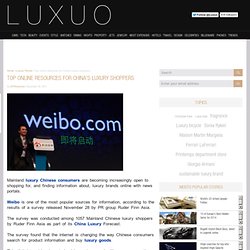
Weibo is one of the most popular sources for information, according to the results of a survey released November 28 by PR group Ruder Finn Asia. The survey was conducted among 1057 Mainland Chinese luxury shoppers by Ruder Finn Asia as part of its China Luxury Forecast. The survey found that the internet is changing the way Chinese consumers search for product information and buy luxury goods. This digital trend is characterized by an increased willingness among the post-1980 generation to shop for luxury products on the internet with 35 percent of respondents stating that they “currently shop for luxury products online.” This increased willingness to shop online is also changing the way Chinese shoppers search for information about luxury products.
Luxury trends vary in China. Understanding China’s E-commerce Market. 2011 China Luxury Forecast. BEIJING, Nov. 28, 2011 /PRNewswire/ -- China's luxury industry's distinct characteristic is its large group of young consumers.
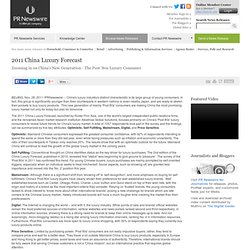
In fact, this group is significantly younger than their counterparts in western nations or even nearby Japan, and are ready to stretch their pockets to buy luxury products. This new generation of mainly 'Post 80s' consumers are making China the most promising luxury market not only for today but also for tomorrow. The 2011 China Luxury Forecast, launched by Ruder Finn Asia, one of the world's largest independent public relations firms, and the renowned Asian market research institution Albatross Global Solutions, focuses primarily on China's 'Post 80s' luxury consumers to reveal future trends for China's luxury market. A total of 1057 respondents took part in the survey and the findings can be summarized by five key attributes: Optimistic, Self Fulfilling, Mainstream, Digital, and Price Sensitive. About Ruder Finn Asia About Albatross Global Solutions. Post-80s Lap up Luxury Goods. China's "post-80s" generation's appetite for luxury brands is making the country a vital market for high-end retailers, according to a new survey.
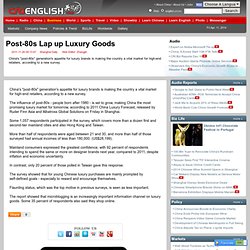
The influence of post-80s - people born after 1980 - is set to grow, making China the most promising luxury market for tomorrow, according to 2011 China Luxury Forecast, released by Ruder Finn Asia and Albatross Global Solutions on Friday in Shanghai. Some 1,057 respondents participated in the survey, which covers more than a dozen first and second-tier mainland cities and also Hong Kong and Taiwan.
Wealthy Consumers From China and Japan Rank Luxury Brands in Four Categories; Lots of Love in Asia for Chanel, Hermes and European Stalwarts. NEW YORK, NY--(Marketwire -11/22/11)- A new series of Luxury Brands Status Index (LBSI) surveys from the independent and objective New York City-based Luxury Institute reveals firsthand impressions and rankings of dozens of luxury brands by high net-worth consumers from Japan and China.
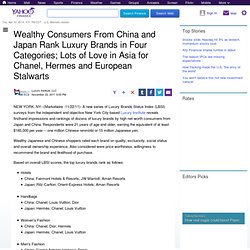
Respondents were 21 years of age and older, earning the equivalent of at least $185,000 per year -- one million Chinese renminbi or 15 million Japanese yen. Wealthy Japanese and Chinese shoppers rated each brand on quality, exclusivity, social status and overall ownership experience. Also considered were price worthiness, willingness to recommend the brand and likelihood of purchase. Based on overall LBSI scores, the top luxury brands rank as follows: How the Chinese Rich Shop… Abroad. Analysts now know that the best place to learn about Chinese ultra-rich consumers is not the mainland. Rather the Maldives, double-chain of islands near the equator, proves to be the perfect place to launch a case study of Chinese consumerism. In 2010, more than 118,000 Chinese visited the country: a 109 percent increase from the year before, making the Chinese the number-one inbound market of the Maldives. Tourists here have helped form the new profile of Chinese consumers.
E-commerce spending in China set to increase 320% by 2015. Annual e-commerce spending in China will reach 2 trillion yuan (US$315 billion) by 2015, a 320% increase from 476 billion yuan (US$75 billion) in 2010, according to a projection released this week by The Boston Consulting Group.

The research firm says China has 145 million online shoppers, second only to the 170 million online shoppers in the United States. By 2015, the report says, the value of e-commerce sales in China will surpass that in the United States. “Online spending in China is expected to surge over the next five years as personal incomes and comfort with online shopping increase,” says the consulting firm.
Luxury E-tailer Shangpin Targets “Untapped” Affluent Chinese Consumers. Beijing-based, members-only e-commerce start-up, Shangpin, is cashing in on China’s growing demand for luxury products. Shangpin, whose name comes from the Chinese characters for fashion, taste, and quality, opened in 2010 with 3 employees to offer luxury consumers easy access to the goods they craved but could not buy in person. The company has scaled quickly largely because it is reaching potential luxury consumers outside of major cities of Beijing and Shanghai who are hungry to improve their lifestyles, but still find it difficult to get designer goods.
Get to Know the Chinese Consumer — The 7 Things. 69023141 gk-seminar-hk-arthur-china. China offers quickest growth in BRIC market for luxury brands: Luxury Briefing Wealth Summit - Luxury Daily - Commerce. Prada went public in Hong Kong LONDON — China is the No. 1 market in which luxury brands should currently be focusing their attention because of consumer desire to both buy products and invest in upscale companies, according to a panel at the Luxury Briefing Wealth Summit 2011.
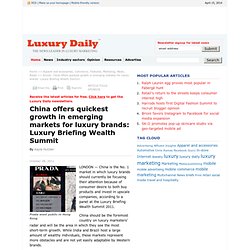
China should be the foremost country on luxury marketers’ radar and will be the area in which they see the most short-term growth. While India and Brazil host a large amount of wealthy individuals, these markets represent more obstacles and are not yet easily adaptable by Western brands. “Over 60 percent of urban population in China wants to enjoy life now,” said Pamela Barbaglia, a London-based journalist from Wealth Monitor. “These people are much younger – they are in their early 30s and mid-20s and predominately men. “It is important to them to spend a lot and, as a result, brands such as Burberry and Prada generate a lot of from China,” she said. Brand Kingdom of China's Gilt: Vipstore.com's Vertical Integration Strategy.
BEIJING, Oct. 31, 2011 /PRNewswire-Asia/ -- With two years' rapid development, China's luxury B2C sector has entered a new stage of consolidation and ferocious level of competition.
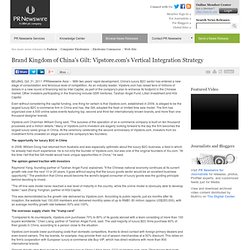
As an industry leader, Vipstore.com has raised tens of millions of dollars in a new round of financing led by Intel Capital, as part of the company's plan to enhance its footprint in the Chinese market. Other investors participating in the financing include GSR Ventures, Taishan Angel Fund, Litian Investment and HGI Capital. Even without considering the capital funding, one thing for certain is that Vipstore.com, established in 2009, is alleged to be the largest luxury B2C e-commerce firm in China and has, like Gilt, adopted the flash or limited time sale model. The firm has organized over 4,500 online sales events featuring top, second and third-tier internationally known brands, and more than one thousand designer brands. More Sites Block Alibaba’s E-commerce Search Engine Etao. (iChinaStock News) Two top Chinese B2C websites Dangdang (NASDAQ:DANG) and Suning have joined 360buy’s move to block Etao , putting the fate of Alibaba’s infant online shopping search engine at risk.
Dangdang and Suning, which together constitute 3.6% of China’s B2C shopping market, was reported to have banned Etao’s ‘spiders’ from crawling its site. That means users will not be able to find Dangdang and Suning product information and user comments when searching on Etao. The move, together with 360buy’s similar act, makes Etao blind to 16% of China’s B2C market, according to figures from Beijing-Based research firm Analysys International. Alibaba’s Taobao Mall (Tmall) accounted for 32.8% of the market, the figures show. What’s Important to China’s International Luxury Travelers? With a million millionaires now in China, the pursuit of sophisticated luxury travel is more fervid than ever before.
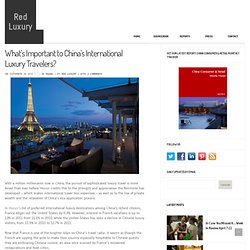
Hurun credits this to the strength and appreciation the Renminbi has developed – which makes international travel less expensive – as well as to the rise of private wealth and the relaxation of China’s visa application process. In Hurun’s list of preferred international luxury destinations among China’s richest citizens, France edges out the United States by 0.3%. However, interest in French vacations is up to 13% in 2011 from 11.1% in 2010, while the United States has seen a decline in Chinese luxury visitors, from 15.9% in 2010 to 12.7% in 2011. Now that France is one of the brighter blips on China’s travel radar, it seems as though the French are upping the ante to make their country especially hospitable to Chinese guests: they are embracing Chinese cuisine, an area once scorned by France’s renowned restaurateurs and food critics.
Luxury Handbags Ditch Logos for Exclusivity. Would no logo be a go for Chinese luxury consumers? Perhaps this appeals to the more sophisticated of China’s elite, albeit a small group, who crave more exclusivity in a growing sea of luxury. The Chinese are not the only ones looking to distinguish through exclusivity. The world’s top luxury accessories brands are learning that the key to maintaining the aura of exclusivity is to hide in plain sight.
To reconcile volatile economies with the demand for greater status symbols, top labels like Chanel and Victoria Beckham are producing high quality bags that speak for themselves, without the use of logos. China Briefing. Chinese Are Snapping Up French Vineyards. China is cultivating new tastes in luxury beverages: wine. As Chinese consumption increases, Chinese investors are looking for ways to be a part of this industry. And what better way than to, quite simply, buy a vineyard? That is exactly what Chinese investors are doing, starting in French wine country: specifically, Bordeaux. And although it’s a point of pride for many vineyard owners to sell their century-old wineries, Chinese demand may be just what the industry needs to recover from recent economic hardships.
Three properties have been sold this year, and three others – including Chateau Richelieu are already owned by the Chinese. Last year, China superseded Germany and the UK to become Bordeaux’s largest customer. Why the sudden surge in China? The Chinese are receptive to this government direction. Chinese wealthy consumers’ new trends « Entice affluent Chinese tourists. Worthington Brown Web Design Rated #1 in Hangzhou China : Wholesale News : Wholesalers, Manufacturers , Retailers and Dropshippers. HANGZHOU, CHINA – There’s no question about it; the single most desired goal of any entrepreneur in the wholesale, retail, and online shopping industry is… getting noticed.
The good news is that high-quality web design Hangzhou China with experience and professional quality doesn’t have to be difficult to locate, nor does it need to be completely inaccessible to English-based foreign enterprises who are doing business in China. Here’s a service provider that really understands what your needs are, without letting anything get lost in translation. UK-founded Worthington Brown Design Ltd . is bringing the professional level quality of western design agencies to China, with a satellite office in the top-ranked tourism and technology city of Hangzhou. The need for such a service has been demonstrated time after time, and the company decided to put themselves directly into the mix, in order to bring an unprecedented level of service to unique clients.
Rating: 0.0/ 10 (0 votes cast) Tapping China’s luxury-goods market - McKinsey Quarterly - Marketing & Sales - Sectors & Regions. Marketing strategies for CVB's to attract affluent Chinese tourists. China Confidential. A Cold Winter Ahead For China’s E-Commerce Industry Amid Overspending On Advertising. China Issues New Inbound M&A Rules. Is It Hammer Time for VIEs? Lady Gaga and China's 12th Five-Year Plan. Money In, Money Out: Explaining China Central Bank's Latest Move - China Real Time Report. Online Retailer Nixes Internet Payment Partnership In China - ChinaRetailNews.com.
August 31, 2011 | By ChinaRetailNews.com Editor | Print | Email China's online retail world is facing a fractured partnership as a leading shopping site ends an agreement with a top payment site. Chinese B2C e-commerce website 360buy.com has published a notice, stating that its cooperation with Alipay.com, the Internet payment subsidiary of Alibaba Group, expired on August 24, 2011, and the company will now stop the use of payment services at Alipay.com. According to 360buy.com, the reason for its termination of the cooperation with Alipay.com is because the service fees charged by the latter are too high, which are reportedly four times higher than 99bill.com, another Chinese Internet payment service provider. 360buy.com said that from now on users will not be able to login to 360buy.com or pay for the orders with their Alipay accounts.
In regards to 360buy.com's decision, Alipay.com said that they respect and understand the business decision made by 360buy.com. Loading ... Concerned about the Consumer? Look at What China Wants. Jing Daily : The Business of Luxury and Culture in China. Chinese tourists are arriving in Europe in record numbers. Next year, their numbers may pass 100 million outbound departures. A new tourism law which took effect this October is challenging the group tour operators and travel agencies to improve the level of service they are offering Chinese tourists and shines a light on the practice of shopping commissions and optional tour sales.
VCs approach luxury goods firms. This dragon has plenty of fire left. Buildings rise out of the Pudong Financial District. Photo: Bloomberg News YU YONGDING, a statesman of Chinese economics, worries that his country's meritocracy is giving way to sycophancy, cynicism and mediocrity. He talks about policymaking dysfunction, about the dynastic cycle of revolution and decline, and how there seems to be no policy challenge that is so great or so pressing that China's collective decision makers can't put it off till tomorrow. But the respected and fiercely independent economist says there is one problem that China does not face: an imminent hard landing. A Chinese clerk counts renminbi banknotes. E-commerce fostering changes in logistics industry. China vs. America: Who Loves Shopping More?
China's Rich: Status is Out, Travel is In. What Makes a City Tier in China? - The China Sourcing Blog. We often hear of China’s first or second or third tier cities, yet what actually makes a city tier? The terms are so often used, yet there is actually no official formula for determining what tier a city falls in. Instead, everyone makes up their own rules. There are a few common views on which Chinese cities fall in which tier, often pointing to population, development of services and infrastructure, and the cosmopolitan nature of the city. First tier cities are naturally the fewest and easiest to find common ground on. Storm Clouds Loom Over China's Luxury E-Commerce. Chinese Consumer Social Technographics Profile. China’s Online Luxury Goods Reached 3.5B RMB in Q2. China's Women Buy Maseratis and Ferraris Like Italian Pastries. China Global Investment Tracker Interactive Map. China's investment in the U.S. and around the world saw steady growth in 2013.
The China Global Investment Tracker created by the American Enterprise Institute and The Heritage Foundation is the only publicly available, comprehensive dataset of large Chinese investments and contracts worldwide (excluding bonds). Details are available on over 1100 attempted transactions -- failed and successful – valued at more than $100 million in all industries, including energy, mining, real estate, and transportation. Showing Data For : Select a Country from the list Worldwide. China Economy @ The China Perspective.